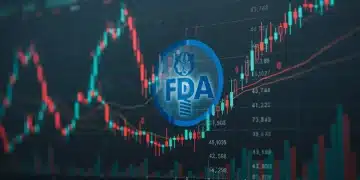Breaking news on global stock exchanges: what to know

Global stock exchanges are influenced by various factors including technological advancements, geopolitical events, and investor strategies that adapt to market volatility, making understanding these dynamics crucial for successful trading.
Breaking news on global stock exchanges is essential for anyone looking to navigate today’s financial landscape. With markets fluctuating due to various factors, it’s crucial to stay updated. What strategies can you use to remain informed?
Current trends in global stock markets
Understanding the current trends in global stock markets is crucial for investors looking to make informed decisions. With rapid changes in market dynamics, staying updated is vital.
Key Factors Influencing Trends
Several key factors are influencing the movements of stock markets worldwide. Geopolitical events, economic indicators, and market sentiment all play a role in shaping these trends. For example, interest rate changes can greatly affect investor confidence.
- Geopolitical tensions impacting trade
- Economic indicators like inflation rates
- Investor sentiment and market psychology
Understanding these elements can help investors anticipate potential market shifts. Additionally, technological advancements are changing how trading occurs, with algorithms and AI influencing stock prices.
The Rise of Sustainable Investing
Another notable trend is the shift toward sustainable investing. Investors are increasingly interested in environmental, social, and governance (ESG) factors. This trend is not only reshaping investment strategies but also influencing companies to prioritize sustainability.
As more investors demand transparency and responsibility, companies are adapting their practices. This shift can lead to financial growth while making a positive impact on the world. Investors should consider integrating ESG principles into their portfolio strategies.
In conclusion, the landscape of global stock markets is evolving. By understanding current trends and their implications, investors can position themselves for success in this dynamic environment.
Impact of geopolitical events on trading

The impact of geopolitical events on trading is crucial in the world of finance. Significant events can lead to rapid changes in market conditions that affect stock prices and investor sentiment.
Types of Geopolitical Events
Geopolitical events come in various forms, influencing markets in distinct ways. These events can range from wars and conflicts to trade negotiations and diplomatic relations. For example, an armed conflict in a key oil-producing region can lead to fluctuations in energy stocks.
- Trade sanctions affecting import/export dynamics
- Conflicts leading to supply chain disruptions
- Political instability influencing currency valuation
Traders must stay alert during these times, as market reactions can be swift and significant. A single news report about a trade deal could send stocks soaring, while news of conflict might lead to a downturn.
Understanding Market Sentiment
The psychology of investors often plays a role in how markets react to geopolitical events. Uncertainty can lead to panic selling, while a positive resolution may spark buying frenzies. This means that traders should not only monitor the events themselves but also the reactions they provoke in the market.
As global interactions become more interconnected, the impact of geopolitical dynamics on trading grows. Events that may seem localized can have ripple effects across the globe. Therefore, having a keen understanding of the geopolitical landscape is essential for effective trading strategies.
Technology and its role in stock exchange dynamics
Technology plays a crucial role in shaping stock exchange dynamics today. It influences how trades are executed, how information spreads, and how investors make decisions.
Automation in Trading
One significant advancement is the rise of automated trading. Through algorithms, trades can be executed in milliseconds, allowing for high-frequency trading strategies. This technology enables traders to analyze vast amounts of data and react to market changes almost instantly.
- Algorithms executing trades automatically
- Speed of transactions increasing market volatility
- Data analysis tools guiding investment decisions
Additionally, algorithms help in identifying patterns that traders may not easily see. This blend of technology and finance is transforming traditional trading methods.
The Impact of Information Technology
The spread of information is also transformed by technology. Investors now receive real-time updates on market trends, news, and data analytics. This immediate access influences trading decisions significantly. For example, a tweet from a major company can move stock prices in seconds.
Furthermore, platforms for trading have become user-friendly. With mobile apps and online brokers, individual investors can participate more easily than ever before. This accessibility allows a broader range of participants in the market, which also affects liquidity.
In conclusion, technology continually reshapes the stock exchange landscape, enhancing efficiency and altering the strategies used by traders. Understanding these advancements is vital for anyone looking to navigate today’s markets successfully.
Investor strategies during market volatility

During times of market volatility, investors need effective strategies to protect their investments and maximize potential gains. Volatile markets can present risks, but they also open up opportunities for savvy investors.
Diversification as a Tool
Diversification is one of the most important strategies to adopt. By spreading investments across different asset classes, sectors, and geographies, investors can reduce risk. If one investment underperforms, others may balance it out.
- Invest in stocks, bonds, and commodities
- Diversify within asset classes, such as tech and healthcare stocks
- Include international investments for a broader exposure
This approach helps investors withstand market ups and downs more effectively and minimizes the impact of economic shocks.
Staying Informed
Another critical strategy is staying informed about market conditions. Investors should follow financial news and analytics to understand the factors driving volatility. Information allows investors to make timely decisions about buying or selling assets.
Using tools like financial reports and economic forecasts can provide valuable insights. In addition, connecting with financial advisors can help clarify complex situations, making it easier to navigate sudden market changes.
Cultivating a calm mindset is also essential during volatile periods. Panic selling can lead to losses, while carefully considered decisions can lead to long-term gains. Preparing a strategy before volatility strikes is key to handling market disruptions effectively.
In conclusion, navigating the world of global stock exchanges requires a keen understanding of various factors. Market volatility presents both risks and opportunities. By employing effective investor strategies, such as diversification and staying informed, individuals can better manage their investments. Additionally, the influence of technology and geopolitical events cannot be underestimated. Keeping a calm mindset helps investors make better decisions in uncertain times. Ultimately, remaining educated and adaptable is crucial for success in this ever-changing market landscape.
FAQ – Frequently Asked Questions about Global Stock Exchanges
What should I do during market volatility?
During market volatility, consider diversifying your investments and staying informed about market conditions to make better decisions.
How can technology impact my trading strategies?
Technology can automate trades and provide real-time information, helping you identify trends and make informed decisions quickly.
Why is staying informed important for investors?
Staying informed helps investors understand market movements and respond to changes promptly, which can lead to better investment outcomes.
How do geopolitical events affect stock markets?
Geopolitical events can cause fluctuations in stock prices as they influence investor sentiment, trading strategies, and market stability.





